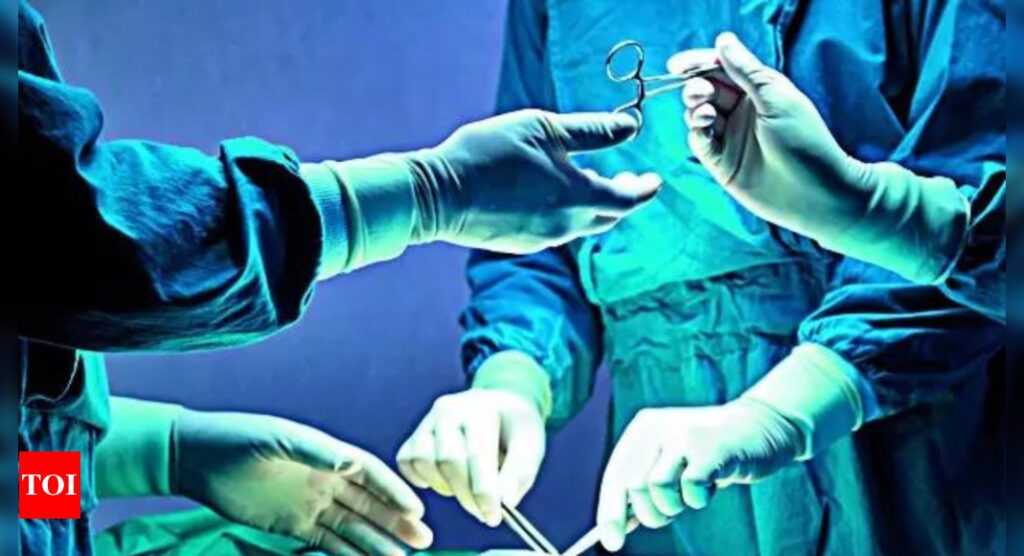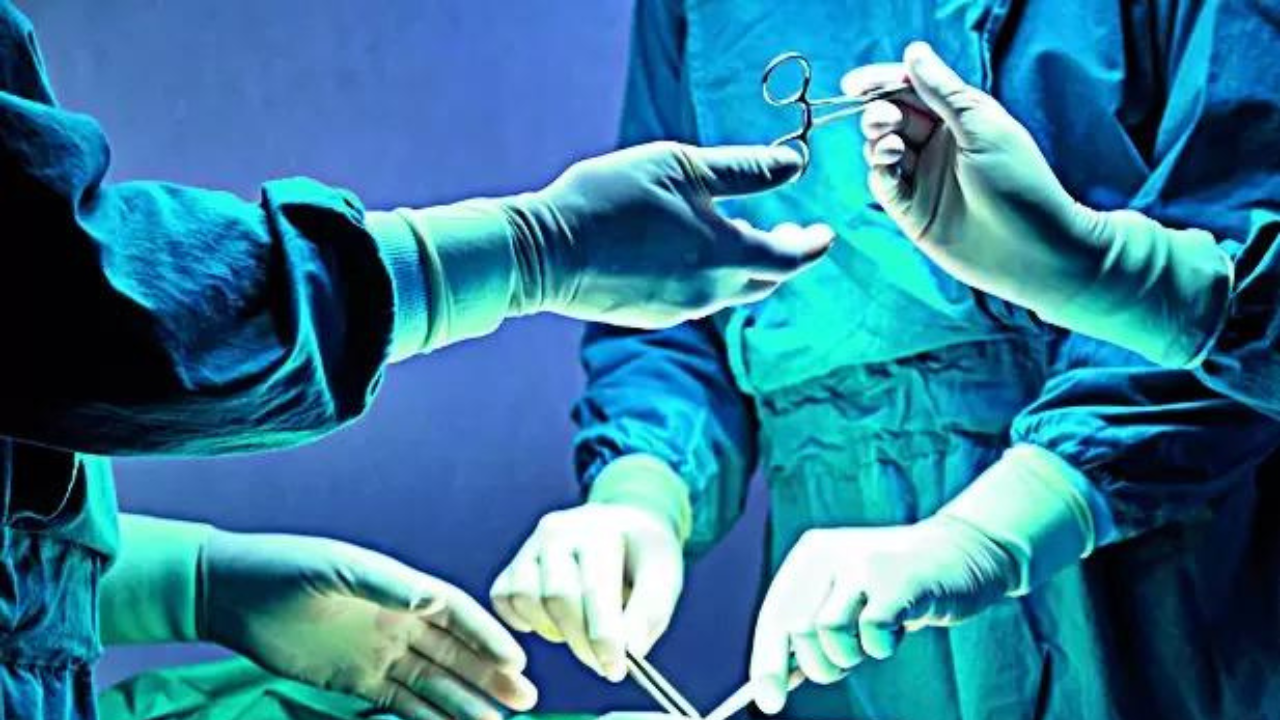[ad_1]
On the day that the Supreme Court heard a public interest petition challenging live surgeries being conducted in medical conferences with specific reference to live surgeries sanctioned by the All India Ophthalmic Society (AIOS), the society organized dozens of them at its mid-term conference in Visakhapatnam. AIOS was charging sponsoring companies Rs 5 lakh for each live surgery session, according to its website.
Despite the petitioners sending a ‘cease and desist’ notice to the AIOS office bearers on October 11 informing them that the matter would be heard by the apex court on October 13, AIOS decided to go ahead with the live surgeries. AIOS president Dr Harbansh Lal told TOI that “live surgeries were performed with formal permission from the Andhra Pradesh State Medical Council, with due precautions as per the standard protocols”. He added that it was done with informed consent by the patients and with appropriate and ensured postoperative care.
Dr Lal further said live surgeries as a medium of interactive education are allowed by the 6 medical councils and government authorities. “There is no restriction till date from any of the courts of India for performing live surgeries,” he added. According to several ophthalmologists, 30-40 live surgeries had been done in a hospital in Visakhapatnam for the conference. That would mean about Rs 1.5-2 crore collected from the live surgery session alone. However, Dr Lal did not answer queries on how much money was collected from the live surgery session and from the conference or details of the live surgeries conducted.
A back of the envelope calculation looking at rates advertised for stalls at the conference shows that all the stalls put together would have netted about Rs 1.6 crore, roughly the same as the money collected from the live surgeries.
A look at some of the live surgery sessions reveals that every session was sponsored by a company making lenses or machines used in ophthalmic surgery. One of the surgeons who featured in the live surgery session was noted ophthalmic surgeon Dr Mahipal Sachdev, who said that he did a deferred live surgery, a video recording of the surgery that he performed at Centre for Sight in Delhi a few days ago as Visakhapatnam still does not have the machine. Dr Sachdev was demonstrating laser refractive surgery to the delegates using the newly approved machine of Johnson and Johnson. His session was sponsored by Johnson and Johnson.
“Usually, a company which sponsors a live session expects their product to be used during the session. It is more about promotion of a product than about education,” said a senior ophthalmic surgeon who is opposed to live surgeries. However, AIOS pointed out in a statement that live surgeries were being allowed by most state, national and international surgical societies including all ophthalmic societies.
Other than the huge power differential between a patient and a doctor, what is not given enough emphasis in most international guidelines and discussions on live surgeries is the reality of poor patients in countries like India being offered the surgery free of cost if they consent to a live surgery, point out those opposed to such surgeries.
Many societies and individual surgeons have raised questions regarding the ethics of live surgery, especially about patient safety. Even the guidelines on live surgery of the American Academy of Ophthalmology, which AIOS references, states: “Inherent distractions in the performance of live surgery include the potential for frequent interruptions from the audience as they ask questions and request clarification as the procedure progresses. The surgeon’s attention may also be distracted because he or she may be operating with unfamiliar staff.”
Surgeons in favour of live surgeries point out that the rate of complication is no more than in regular surgeries. However, it is well known that complications and adverse events in live surgeries are hardly ever reported or monitored. “A Google search of the term ‘live surgery death’ yielded 4 cases reported in newspapers. However, the very same search on PubMed yielded nothing, indicating a serious reporting bias in the scientific world,” noted an article on the ethics of live surgery demonstration in the journal Vascular Specialist International.
Despite the petitioners sending a ‘cease and desist’ notice to the AIOS office bearers on October 11 informing them that the matter would be heard by the apex court on October 13, AIOS decided to go ahead with the live surgeries. AIOS president Dr Harbansh Lal told TOI that “live surgeries were performed with formal permission from the Andhra Pradesh State Medical Council, with due precautions as per the standard protocols”. He added that it was done with informed consent by the patients and with appropriate and ensured postoperative care.
Dr Lal further said live surgeries as a medium of interactive education are allowed by the 6 medical councils and government authorities. “There is no restriction till date from any of the courts of India for performing live surgeries,” he added. According to several ophthalmologists, 30-40 live surgeries had been done in a hospital in Visakhapatnam for the conference. That would mean about Rs 1.5-2 crore collected from the live surgery session alone. However, Dr Lal did not answer queries on how much money was collected from the live surgery session and from the conference or details of the live surgeries conducted.
A back of the envelope calculation looking at rates advertised for stalls at the conference shows that all the stalls put together would have netted about Rs 1.6 crore, roughly the same as the money collected from the live surgeries.
A look at some of the live surgery sessions reveals that every session was sponsored by a company making lenses or machines used in ophthalmic surgery. One of the surgeons who featured in the live surgery session was noted ophthalmic surgeon Dr Mahipal Sachdev, who said that he did a deferred live surgery, a video recording of the surgery that he performed at Centre for Sight in Delhi a few days ago as Visakhapatnam still does not have the machine. Dr Sachdev was demonstrating laser refractive surgery to the delegates using the newly approved machine of Johnson and Johnson. His session was sponsored by Johnson and Johnson.
“Usually, a company which sponsors a live session expects their product to be used during the session. It is more about promotion of a product than about education,” said a senior ophthalmic surgeon who is opposed to live surgeries. However, AIOS pointed out in a statement that live surgeries were being allowed by most state, national and international surgical societies including all ophthalmic societies.
Other than the huge power differential between a patient and a doctor, what is not given enough emphasis in most international guidelines and discussions on live surgeries is the reality of poor patients in countries like India being offered the surgery free of cost if they consent to a live surgery, point out those opposed to such surgeries.
Many societies and individual surgeons have raised questions regarding the ethics of live surgery, especially about patient safety. Even the guidelines on live surgery of the American Academy of Ophthalmology, which AIOS references, states: “Inherent distractions in the performance of live surgery include the potential for frequent interruptions from the audience as they ask questions and request clarification as the procedure progresses. The surgeon’s attention may also be distracted because he or she may be operating with unfamiliar staff.”
Surgeons in favour of live surgeries point out that the rate of complication is no more than in regular surgeries. However, it is well known that complications and adverse events in live surgeries are hardly ever reported or monitored. “A Google search of the term ‘live surgery death’ yielded 4 cases reported in newspapers. However, the very same search on PubMed yielded nothing, indicating a serious reporting bias in the scientific world,” noted an article on the ethics of live surgery demonstration in the journal Vascular Specialist International.
[ad_2]
Source link











More Stories
Congress replaces Kamal Nath, names an OBC as Madhya Pradesh chief | India News
Fire breaks out in ITBP camp in Srinagar; none hurt | India News
Parliament Security: Co-villagers give clean chit to Lalit Jha, parents to move court | India News